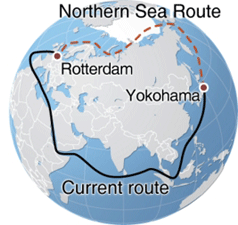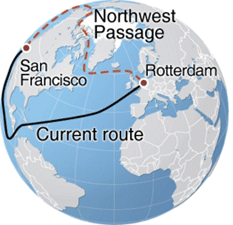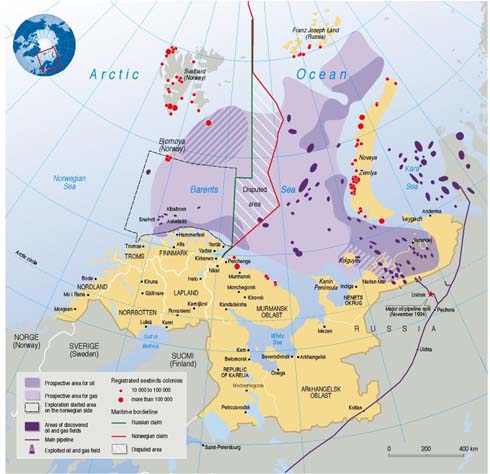Arctic in The Balance
5 Jul, 2007 10:07 am
The Arctic is becoming increasingly accessible because of climate change, and as such governments and big Industry see much to be gained from the potential untapped natural resources. While scientists worry about the threat to biodiversity.


Northern Sea Route and the Northwest Passage compared with currently used shipping routes (Based on a figure from Aftenposten, Norway, Hugo Ahlenius, UNEP/GRID-Arendal, Source)
Yet, there is some uncertainty as to whether the Northwest Passage would be considered international waters or not. Canada strongly asserts that the Northwest Passage clearly falls within its territory. That claim is strongly contested by the United States, which refuses to acknowledge thisstating that the waters fall into the category of international waters. To reinforce its position it regularly sends military on expeditions to the most northern parts of its territory to maintain a constant presence to legitimize its claims. Though it would seem most probable that this dispute will be resolved according to the United Nations Convention of the Law of the Sea, which states that territory is determined by how far a nation's continental shelf extends into the sea. Interestingly, countries only have a limited time to map the sea floor and make their claims after ratifying the treaty. While Canada and others have taken heed of the treaty to maximize their gains, the United States has been reluctant to act due to acertain number of conservative members of congress that refuse to see the United States adhere to any binding international agreements.
In addition to the dispute over the nature of the Northwest Passage remains the dispute over to whom the Arctic belongs. Unlike the Antarctic, which was divided up back in 1959, the fate of Arctic remains to be decided. Canada, Denmark through Greenland, Russia, and the United States are all vying for the prize. Russia would like to see the Arctic divided according to the 'sector line principle' or cut a cake, while others would like to see the border divided according to the 'median line principle', a border line along which each point is equidistant to each country's land mass. In a stunning move, last week Russian scientists declared under the UN Convention of the Law of the Sea that the Lomonosov Ridge is geologically linked to the Siberian continental platform. This declaration is already being contested by the other Arctic states, and will be highly scrutinized.
Why would these major international players be so interested in a huge block of ice? Natural resources, of course. According to the U.S. geologicalstudy, the Arctic most probably represents about at least a quarter of the natural resources on the planet. Certainly, given that the price of oil and the consumption have increased simultaneously, this represents a golden opportunity for these countries with major consumption needs and powerful energy companies.

Oil and gas development and seabirds colonies in the Barents Region. (Norwegian Polar Institute (NPI), NINA-NIKU, WCMC and various sources compiled by the author, Philippe Rekacewicz, UNEP/GRID-Arendal, source).
All of this is good news for industry, but the news is not all warm and fuzzy. Clearly such a major change in the ecosystem will have negative consequences. For example, the native people of the Arctic, the Inuit way of life, which depends on the presence of ice, will dramatically change. Furthermore, there is little doubt that many species will become extinct like the Polar Bear, the Artic Fox, Seals among others. Yet, at the same time researchers expect to uncover new species that were previously inaccessible. In the end unfortunately, the fact that many species will become extinct and native peoples lands and ways of life will be gone aren't the main concerns given what's at stake and what's to be gained by some.
Read more..
Northwest Passage Soon to Be Exploited
Arctic Biodiversity: certain loss, potential discoveries?
"The Arctic is a Treasure Trove of Natural Resources"
"We Are Frightened of Pollution and New Invasive Species Taking Over"






